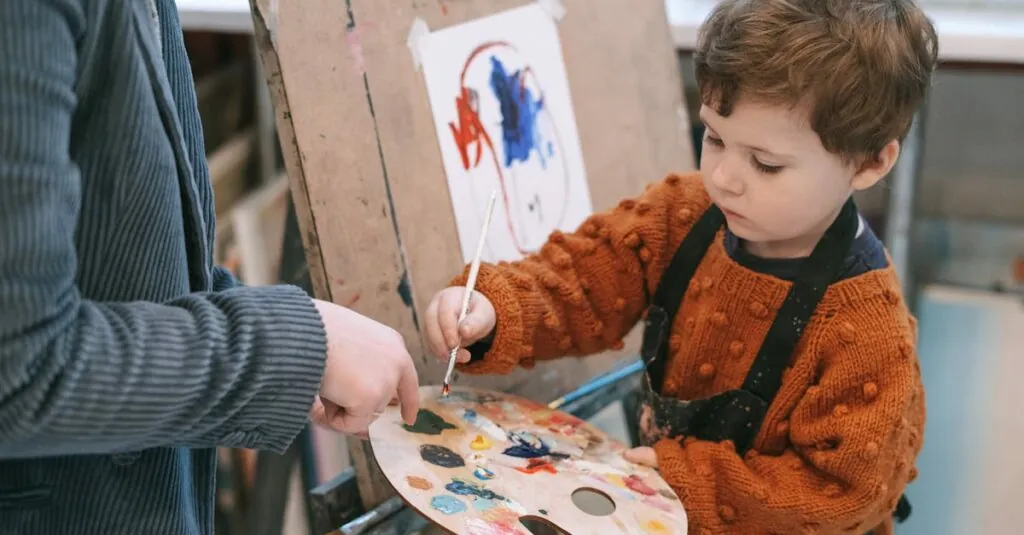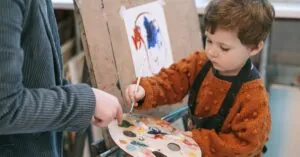Table of Contents
ToggleImagine a world where preschoolers unleash their creativity like a school of octopuses in an underwater art studio. Octopus craft preschool isn’t just about glue and glitter; it’s a vibrant playground where tiny hands transform simple materials into masterpieces. With eight arms of inspiration, kids dive into fun activities that spark their imagination and boost their fine motor skills.
Overview of Octopus Craft Preschool
Octopus Craft Preschool provides a vibrant environment where preschoolers explore creativity and artistic expression. Young children participate in diverse activities, transforming simple materials into imaginative creations. This creative play mirrors the fluid, colorful nature of octopuses, inspiring kids to think outside the box.
Engagement with craft projects fosters fine motor skills, aiding in hand-eye coordination and dexterity. Children manipulate various supplies, including paper, paint, and glue, making connections between their ideas and tactile experiences. Building these skills is essential in early childhood development, promoting confidence in their abilities.
Teachers play a crucial role in guiding activities, encouraging collaboration, and sparking imagination. Structured sessions allow kids to learn from one another, developing social skills and teamwork. Observing their peers increases inspiration, leading to innovative approaches in crafting projects.
Octopus Craft Preschool combines education with playful creativity, highlighting the importance of hands-on experiences. Fostering an atmosphere rich in exploration encourages a love for learning that extends beyond art. As young artists flourish, they create memories that contribute to their overall growth and development.
Benefits of Octopus Crafts
Octopus crafts offer numerous advantages for preschoolers, fostering both creativity and skill development. Engaging in these activities nurtures various aspects of a child’s growth.
Enhancing Creativity
Engagement in octopus crafts stimulates creative thinking. Children learn to express themselves through unique designs and imaginative concepts. The process allows them to explore colors, textures, and shapes without limitations. Each session encourages experimentation, which fosters innovative ideas. By combining diverse materials, kids create personalized masterpieces that reflect their individuality.
Imagination flourishes in a supportive environment, where teachers encourage artistic exploration. Collaboration with peers enhances inspiration as children share techniques and ideas. This playful approach nurtures a passion for creativity that extends beyond crafting.
Fine Motor Skills Development
Participation in octopus crafts strengthens fine motor skills essential for early childhood development. Activities involve cutting, gluing, and assembling, which enhance hand-eye coordination. As children manipulate tools and materials, they refine their dexterity and control. These skills play a crucial role in later tasks like writing and typing.
Structured crafting sessions promote focused attention and precision. Teachers guide children through complex projects, helping them develop patience and persistence. Witnessing tangible results of their efforts boosts confidence and reinforces the value of practice. Overall, octopus crafts provide enriching experiences that support extensive skill development.
Popular Octopus Craft Ideas
Engaging children in octopus-themed crafts sparks their creativity and fine motor skills. Here are some popular ideas that work well in a preschool environment.
Paper Plate Octopus
Creating a paper plate octopus fosters imaginative use of simple materials. Start with a paper plate as the base, allowing kids to paint it in bright colors. After painting, cutting strips from the plate’s edge becomes an engaging task for little hands, creating tentacles. Once the tentacles are ready, children can glue on googly eyes, enhancing the octopus’s personality. This project emphasizes fine motor skills through cutting, painting, and gluing while introducing concepts of shape and color.
Salt Dough Octopus
Making a salt dough octopus combines tactile fun with creativity. To start, mix flour, salt, and water to create a moldable salt dough. Children can shape the dough into an octopus form, using their hands to roll and press the material into desired shapes. Once shaped, kids can decorate their octopus using paints, beads, or other embellishments. This activity promotes creativity and strengthens hand muscles while encouraging teamwork and sharing during the crafting process. After baking, kids take home a unique piece of art, enhancing their pride in creativity.
Materials Needed for Octopus Crafts
Gathering the right materials makes octopus crafts engaging and enjoyable for preschoolers. Specific supplies enhance creativity and skill development, ensuring a fun experience.
Recommended Craft Supplies
Begin with basic items like colorful construction paper, which serves as excellent bases for octopus creations. Scissors are essential for cutting paper into desired shapes, while glue sticks effectively adhere pieces together. Googly eyes add a playful touch, bringing the octopuses to life. Featuring vibrant paint or markers allows for customization, enabling kids to express their artistic flair. Lastly, pipe cleaners serve as great tentacles, introducing texture and flexibility into the crafts.
Eco-Friendly Alternatives
Consider using recycled materials to create octopus crafts, promoting sustainability alongside creativity. Old cardboard can become a sturdy base, while empty plastic bottles transform into a fun octopus form. Paper towel rolls stand as perfect tentacles when cut and painted. Nature-based dyes, made from fruits and vegetables, provide a non-toxic coloring option. Finally, natural twine serves as an eco-friendly alternative for attaching crafted pieces, allowing children to connect art with environmental awareness.
Tips for Successful Craft Sessions
Successful craft sessions require careful planning and organization. Gather all materials beforehand to create a smooth workflow. A checklist can help ensure nothing gets overlooked, which minimizes interruptions. Setting a designated crafting area fosters focus and creativity among preschoolers. Make sure the space is safe and accessible, allowing children to explore freely.
Planning and Preparation
Thoughtful planning enhances the crafting experience. Select age-appropriate projects that align with children’s skills and interests. Prepare all necessary materials, ensuring they are easy to use and child-friendly. Visual aids, such as step-by-step instructions or pictures, help children understand processes better. Finally, create an inviting atmosphere by decorating the space with completed crafts to inspire imagination.
Encouraging Participation
Engagement during crafting sessions motivates children to express their ideas. Ask open-ended questions to spark creativity, allowing kids to share their design choices. Offer praise for their efforts, fostering a positive environment. Incorporating group activities encourages collaboration, letting children learn from each other. Additionally, rotating roles within projects ensures everyone participates and contributes, making the experience fun and inclusive.
Octopus Craft Preschool stands out as a vibrant hub for creativity and skill development. Through engaging activities, children not only create unique masterpieces but also enhance their fine motor skills and social interactions. The supportive environment encourages experimentation and collaboration, allowing kids to express themselves freely.
With a variety of octopus-themed craft ideas and essential materials, each session becomes an opportunity for growth and exploration. Teachers play a crucial role in guiding these experiences, fostering a love for learning that extends beyond the classroom. Embracing the playful nature of crafting, Octopus Craft Preschool nurtures the imaginative spirit of every child, setting the stage for lifelong creativity and self-expression.




